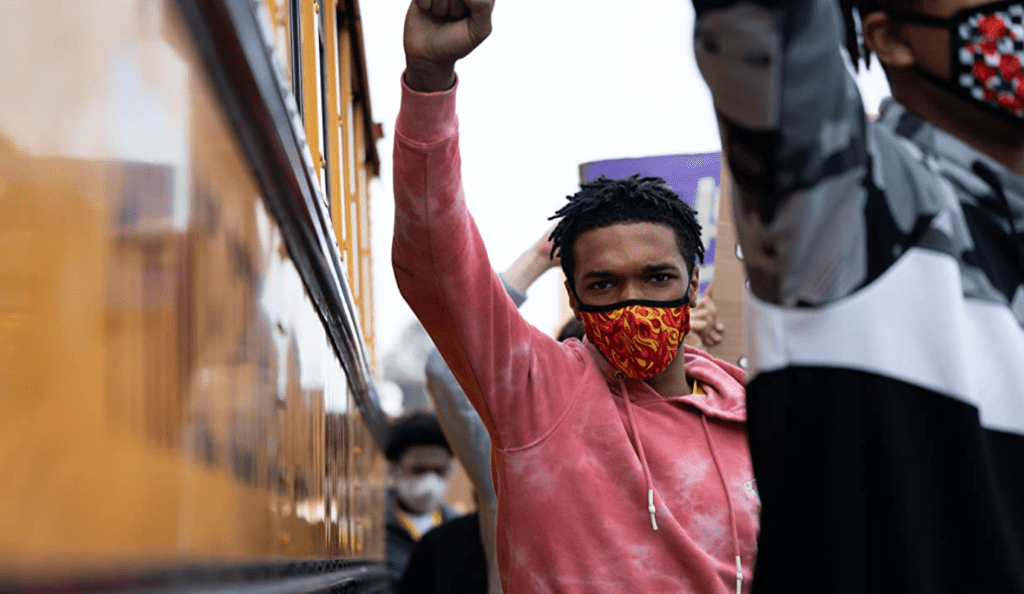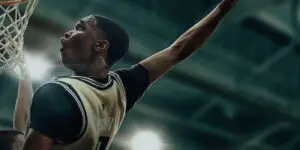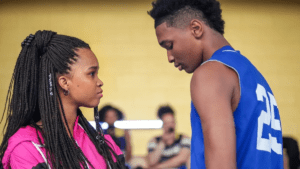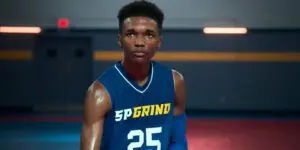Summary
“#RADICALS” is a potent, powerful, and necessary examination of the social issues that shape American youth.
This recap of Swagger season 1, episode 7, “#RADICALS”, contains spoilers.
One of the lamest criticisms I’ve seen of Swagger is that it’s insistent on crowbarring social issues into what should be a story purely about basketball — with a bit of luck, “#RADICALS” should prove why that criticism makes no sense. Swagger is only about basketball in the way that, say, The Walking Dead is about zombies. The set dressing is really just an excuse to explore the rapid decline of the American republic as people become increasingly divorced from their sense of morality and understanding and are reduced to unthinking husks shuffling along in obliviousness and ignorance.
Swagger season 1, episode 7 recap
The whole “just stick to basketball!” criticism presupposes that kids such as those on the Swagger DMV team exist in some kind of weird pocket dimension where the sociopolitical aspects of their communities, backgrounds, education, and future opportunities are somehow irrelevant. We’re to brush over the Covid-19 pandemic as though it didn’t ravage sporting institutions the world over; we’re to take a team of predominantly Black players and coaches being held at gunpoint over breakfast as “tokenistic”, as though that kind of thing doesn’t happen all the time; we’re to consider sexual and domestic abuse as “preachy”, as if predatory coaches and parents don’t exist, and don’t exploit those too vulnerable to stop them at the time and too powerless to do anything about it after the fact. Swagger is barely even about basketball, really — sticking to just that would be a waste of everyone’s time.
So, “#RADICALS” uses the latest league game — a distant away match against Nick’s old team, sponsored by Gladiator Sneakers — as an excuse to unpack some of the more crucial contemporary issues, including a pandemic that is tightening its grip around the sport’s throat and a deeply prejudiced wing of law enforcement that still believes six-foot-four Black boys must always be on the verge of shooting someone rather than, say, enjoying pancakes and hash browns. It bundles up a lot of different perspectives and issues and revels, mostly, in the confusion at the center of it all; it doesn’t profess to have an easy answer to any of this, but it’s insistent that everyone, including kids, should be allowed the time, space, and understanding to figure out an answer for themselves.
A lot of this is a matter of perspective. When the team stops off for a meal on the way to the game and one of the patrons makes a vague complaint that summons the local sheriffs, Swagger is held at gunpoint and told to leave halfway through their meals. Ike and Naim, having evidently lived through many situations like this and become more acutely aware of the potential consequences, are willing to play along, but Jace is incensed. He takes Ike’s compliance as cowardice and failure. He wanted to stay and finish his food, and for his team to do the same; he wanted to apply the same winner’s mentality that has led him to success in basketball to the real world without realizing that, in the real world, it might get him killed.
The incident in the diner doesn’t sit well with Jace, though, so when they arrive at the venue, which is basically the structural embodiment of “both sides-ism”, with relics of the North and South side-by-side at the gates, and Confederate flags draped opposite the Stars and Stripes, he’s compelled to take the knee during the national anthem. All of the other players and coaches end up doing the same except for Nick and Royale. The crowd, which includes Meg’s father, immediately turns hostile, and the ref starts making dodgy calls. When Nick is in possession, the crowd starts chanting “ICE!” (shout out to Drew for shouting, “He’s Puerto Rican, you idiots!” in response.) The team rapidly begins to fall apart.
In the face of such hostility, the question becomes whether to abandon the game or keep playing regardless, a matter which has to be settled in the locker room at halftime. The coaches know it’s up to the players to make this decision, so they try to work through it as best they can, weighing up the pros and cons of fleeing from a fight they can’t win — “If people can’t hear you, you can’t change them,” Ike said to Jace earlier — or rising above the abuse in solidarity. It isn’t as simple a matter as you might think, at least not for everyone. When Jace challenges Nick on why he didn’t kneel, he explains it was because to do so would have left Royale standing alone, and Royale wasn’t willing to kneel because he doesn’t feel as though he’s a proper part of the team due to his wealthy family. You can see here the interplay of socioeconomic backgrounds and expectations, even though we know that Royale suffers more crushing pressure and borderline abuse from his father than any of the other players, except perhaps Phil, though for very different reasons, experience from their own. For Swagger to come together as a team they don’t just need to be in agreement, but understanding.
Of course, when Swagger does come together, it’s with style. Drew subs himself out for Royale, allowing him the chance to prove that his intense studying of the opposition tactics is worthwhile, and Jace finally sacrifices his own limelight to give Nick, who has been bothered by the abuse more than he was letting on, the game-winning shot. Naturally, the shot is disallowed and Swagger lose, echoing Ike’s wise sentiments earlier about being unable to change people who aren’t willing to listen. But they manage to hear each other, and become closer as a team, regardless of the result. On the way home, the bus is delayed by a protest that the team joins in with, having realized they, and indeed the show, are a part of something much bigger than just basketball.
You can stream Swagger season 1, episode 7, “#RADICALS”, exclusively on Apple TV+.




